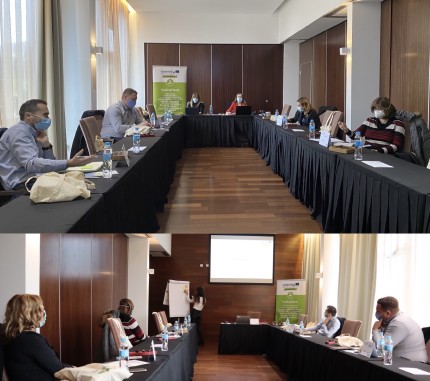Project partner City of Križevci has organized first Regional Working Group (RWG) at Associated partner LifeClass Terme Sveti Martin’s Hotel SPA Golfer on Wednesday, 11th of November 2020.
Participants on the meeting were: Energy Institute Hrvoje Požar’s researcher Sanja Živković Ph.D., Varaždin County’s Branimir Nađ from Department for Economy and European Affairs, then Municipality of Stubičke Toplice’s Mayor Josip Beljak and Julius Rose Ltd.’s director and Terme Tuhelj advisor Mrs. Ivana Kolar.
During the meeting the role of Regional Working Group within the project task Integrated Strategy for sustainable management of SPAs natural resources was explained.
There was a discussion on reports that were made within the project by Energy Institute Hrvoje Požar as they have shown some good and some bad sides in environmental issues in SPAs and its municipalities, good examples are Sveti Martin na Muri and Stubičke Toplice municipalities with highest level of sewage network and biological purifiers of the waste water.
Mrs. Kolar (Julius Rose Ltd.) gave very good exposition of ecological aspect: “Where there is thermal water or construction of a SPA - the question of ecological aspects immediately arises, the owner should know the structure and be environmentally aware. In Terme Tuhelj SPA, they had large investments, capacity expansion and there were a lot of challenges, not "conflicts" – better to call them challenges. Luckily, the owners think positively and "green", so they adhered to the postulates of sustainability. She has also emphasized the need of socially responsible business - it is important to take care of the environment, every company must deal with it. In the SPA Tuhelj they try to include the environment in their business, they invited a number of producers to join the food preparation chain, organized a series of events for everyone, but free for the locals – e.g. “ART & SPA” Tuhelj connecting culture and wellness. It is important that Hotels take the guests outside, not just use the Resort services. They have a welcome card that provides discounts on many services in the area.
There has also been discussion about what should be accelerated in the means of SPA business’ cooperation with local public administration/government?
Mrs. Kolar (Julius Rose) stated that the emphasis is on harmonization of market goals and needs and also that everyone has a part of their responsibility; the investor or the tour facility must think green and contribute, the public administration should give support and build communal infrastructure because the Hotel alone is no longer enough. Today's tourists are looking for more, what they will do in the destination, a greater contribution from public administration is needed, the problem is the budget and the risk is to embark on a project, but if it the project is good and they agree together, it is not difficult to find financial means. An example is given by the Olimia SPA in Slovenia, where a number of other providers appeared next to the SPA, the Municipality showed the direction of movement and has built a sports hall, tennis courts, a lookout at a height of 60 m and a promenades to it and around.
Sanja Živković (Energy Institute Hrvoje Požar) stated that SPAs everywhere are the driver of local and regional development and they must be.
Also important information and comparison was made towards the end of the RWG workshop by Mrs. Kolar; that Slovenia as a neighbouring country promotes healthy living, there is promotion by the state, reduced tax on pool tickets to 10% (in Croatia it is still 25%). Also Croatia passed a new rulebook on health tourism that does not recognize SPAs as part of health tourism - only where there is medical treatment it is health tourism. SPAs managed to get the rulebook to read: “Ordinance on certain forms of health services provided in the field of health tourism and standards and norms for their performance”.

